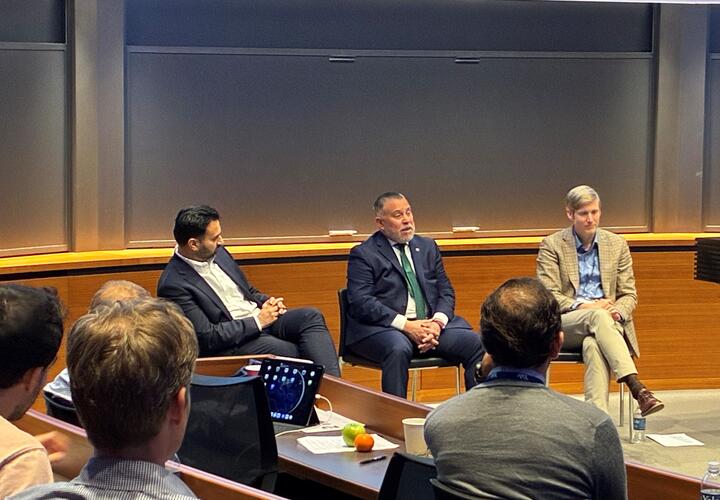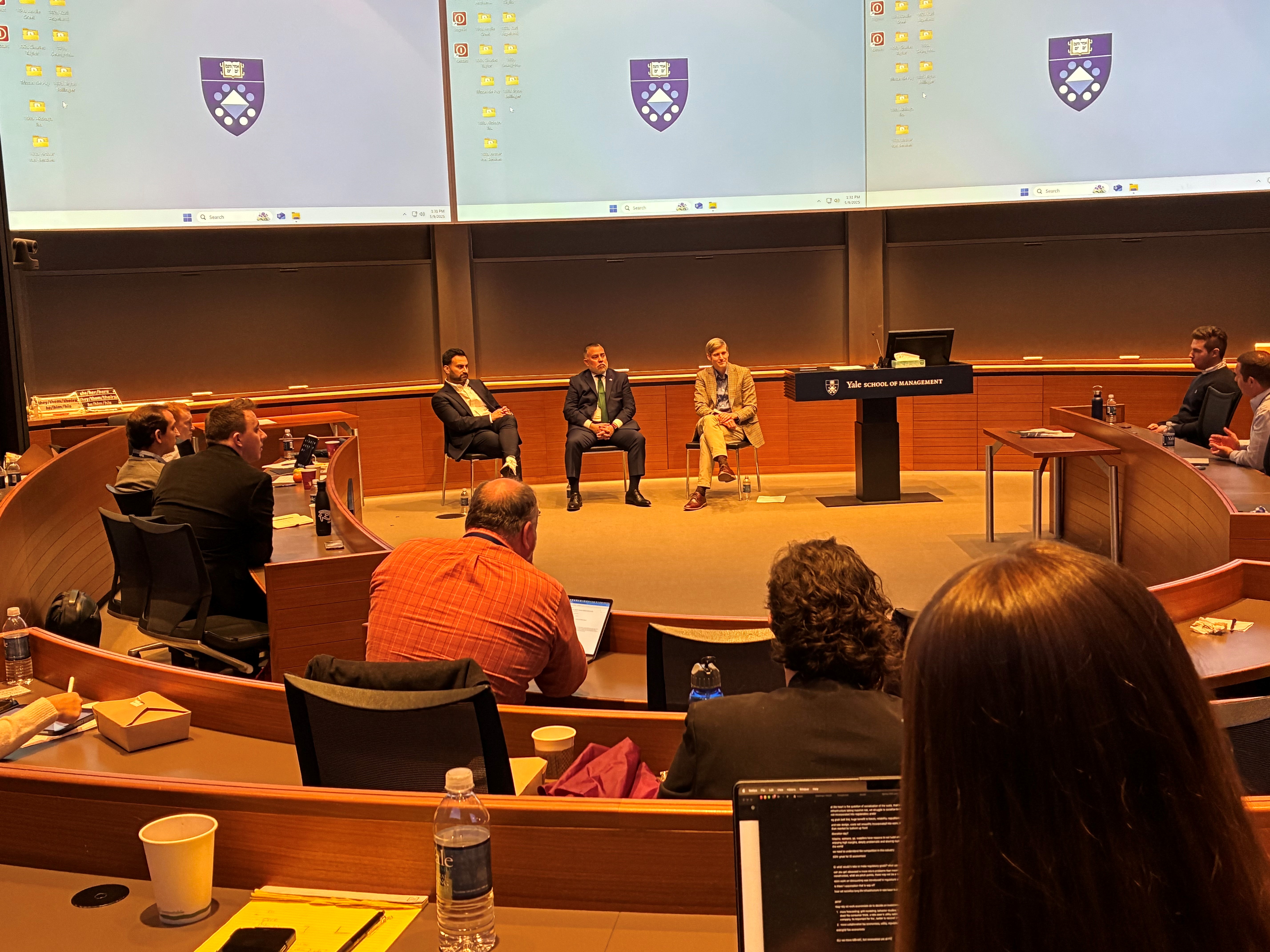Insights from the Northeast Workshop on Energy Policy and Environmental Economics (NWEPEE)

The Northeast Workshop on Energy Policy and Environmental Economics (NWEPEE) brought together leading economics researchers for two days of innovative presentations at Yale University. Organized by Professors Kenneth Gillingham and Nick Ryan, the workshop showcased research projects tackling questions that matter for both academic research and real-world policy challenges in energy and environment.
The workshop began with Stefano Giglio's research on biodiversity economics, showing how species losses create cascading economic vulnerabilities, followed by Karl Aspelund's analysis of Iceland's fisheries revealing the tradeoffs between market efficiency and worker welfare. A policy panel featuring former White House Climate Advisor Ali Zaidi highlighted real-world implementation challenges for climate policy, from AI's growing energy demands to transmission bottlenecks constraining offshore wind. Day two showcased the field's expanding scope: Suresh Naidu's analysis of how climate shocks reshape American politics, Dev Patel's study of why Bangladeshi farmers struggle with environmental information, and rapid-fire presentations spanning topics from electric vehicle charging to disaster aid allocation. The research covered various angles from traditional cost-benefit analysis to understanding complex behavioral, political, and technological dynamics shaping climate policy.
NWEPEE was sponsored by the Tobin Center for Economic Policy; the Climate, Energy and Growth Initiative at the Yale Economic Growth Center (EGC); and the Center for Business and the Environment at Yale (CBEY).
 Noel Sardalla
Noel Sardalla
Attendees at the event observe the Lunch and Policy Panel with Ali Zaidi (former White House) and Javier Bucobo (Avangrid), moderated by Kenneth Gillingham.
The economics of biodiversity loss
The workshop opened with research from Stefano Giglio (Yale) who presented pioneering work with co-authors on biodiversity loss. Their model shows how different species work together - like pollinators, pest controllers, and seed dispersers – to provide natural services that support farming and other economic activities. A key insight from their work: biodiversity losses create increasing fragility, where losing a few species initially may seem harmless but makes ecosystems much more vulnerable to collapse if additional species are lost. For example, losing some bee species might not immediately hurt crop yields, but it makes the pollination system fragile if disease hits the remaining bees. Their analysis of global financial markets showed that countries with higher biodiversity risk already face differential credit default swap responses to environmental news, meaning investors are already pricing in these ecological risks when they assess country-level financial stability.
Efficiency and equity in environmental markets
Karl Aspelund (MIT) examined Iceland's fisheries permit market, showing fundamental tensions in environmental policy design. Using unique data linking firm production and worker earnings, he documented how permit trading increases efficiency but reduces labor demand, particularly for low-income workers. His analysis showed market segmentation costs $990 per thousand additional person-days of employment created, while production requirements (such as requiring boats to actually harvest at least 50% of their permitted fish quota rather than just selling the permits) are more effective at income redistribution. The research demonstrates how trading restrictions can serve redistributive functions at measurable efficiency costs.
Valuing solar subsidies through consumer behavior
Bryan Bollinger (Dartmouth, formerly NYU) presented joint research with Kenneth Gillingham (Yale) and Justin Kirkpatrick (Michigan State) examining how households discount future solar payoffs. Using variation in electricity rates across California, they found households discount future solar benefits at 13.1% annually, higher than government borrowing rates, with low-wealth households showing even higher rates at 15.3%. The findings suggest that shifting from flow subsidies like net metering to upfront rebates could improve both efficiency and equity.
Simplicity vs. sophistication in electrical pricing
Arthur van Benthem (UPenn) and colleagues analyzed all major US electricity markets over two decades, asking how well simplified pricing schemes capture real-time pricing benefits. Their analysis revealed that time-of-use and critical peak pricing each capture about 10% of efficiency gains from perfect real-time pricing (17-20% jointly). Surprisingly, the researchers found that complex schemes often backfire, due to the difficulty of correctly matching retail prices with varying wholesale prices, and that simpler approaches perform better when predicting out-of-sample patterns.
Policy perspectives from practice
The first day featured a policy panel with Ali Zaidi, former White House National Climate Advisor, and Javier Bucobo from Avangrid, moderated by Kenneth Gillingham. The discussion highlighted pressing energy market trends, particularly AI's explosive energy demand driving 30-50% load increases and creating capacity concerns for utilities. Panelists emphasized how geopolitical decoupling between major economies is reshaping energy markets, while transmission infrastructure is emerging as a critical bottleneck. In the case of East Coast offshore wind development, it appears that economic costs and regulatory barriers are both important constraints.
Health systems under climate pressure
On the second day of the workshop, Matthew Neidell (Columbia) presented research with co-authors on Mexico's healthcare system during extreme heat. Using hospital data and temperature measurements, they documented a troubling paradox: heat increases emergency visits, creating "killer congestion" that increases mortality rates from spillover effects on all patients, due to hospitals discharging patients more quickly and thus providing them less care.
Political economy of climate action
Suresh Naidu (Columbia) presented joint work on climate politics using precinct-level voting data and candidate environmental positions in the US. They found that climate shocks and energy transition employment affect both voter behavior and politician positions. Areas with extreme temperature days show increased Democratic support, while fossil fuel job locations show Republican support. The research enables projections of how climate change might reshape politics.
Learning from environmental beliefs
Dev Patel (Harvard) concluded the workshop with research on environmental beliefs among rice farmers in Bangladesh. Using sensor-based soil salinity measurements and visual belief elicitation techniques, he documented substantial errors in farmers' environmental knowledge. His information experiments revealed that correcting these beliefs has large impacts on adaptation decisions: better salinity information changes seed demand by 41% relative to market price, while choosing appropriate seeds increases annual earnings by 14%. The research suggests that improving environmental information could increase agricultural profits by 16%, highlighting the critical role of accurate beliefs in climate adaptation policy.
Other research highlights
The workshop featured several other important contributions. Jasdeep Mandia (MIT) presented joint work on California's 2018 wildfire season, tracking how smoke affects household migration and firm performance. They found that smoke exposure caused 68,000 households to relocate, with $20 billion in property value impacts.
Charles Taylor (Harvard) presented joint work with Meredith Fowlie (Berkeley) examining tensions between renewable energy development and land conservation. Analyzing 28,000 projects in the interconnection queue (the waiting list for new power plants to connect to the electrical grid), they found that while conservation protections reduce project development probability, system-wide cost impacts are smaller than feared.
Akshaya Jha (CMU) presented joint work on historical analysis of power plant siting decisions from 1900-2020, revealing that while the proportion of Black residents had little effect on initial siting decisions, it gradually increased in counties after the arrival of their first fossil fuel power plant – by up to 5 percentage points after 50-70 years.
Tristan du Puy (Columbia) presented their analysis of France's MacSharry agricultural reform, which shifted from output price supports to land subsidies. Using detailed farm-level data and satellite measures of water pollution, they found that the reform unexpectedly reduced both production costs (by 20%) and chemical use per unit of output (by 38%). The environmental benefits came primarily through input substitution - since land and chemicals are substitutes in production, making land relatively cheaper through subsidies led farmers to use less chemical inputs. A secondary effect was selective exit of less efficient farms, though this had a smaller impact.
Rapid research egg-timer sessions
The workshop featured lightning-round presentations highlighting emerging research. Kenneth Jung (Yale) analyzed moral hazard in timber auctions during beetle outbreaks, while Kelsey Larson (Montana State) showed how targeted conservation easement subsidies could achieve greater environmental protection at lower cost. Infrastructure challenges were explored by Jing Li (Tufts) on electric vehicle charging congestion pricing and Richard Sweeney (Boston College) on inefficiencies in decentralized wind investment. Anshuman Bhakri (Boston College) presented contract design solutions for renewable energy auctions in India, and Andie Creel (Yale) examined how heat and green space affect urban business revenue. Seung-Min Kim (Columbia SIPA) analyzed political bias in disaster aid using administrative and satellite data.
Looking forward
The wide-ranging research presented at NWEPEE showcases how environmental economics is well-positioned to address the most pressing challenges of our time. Using rich datasets from contexts ranging from high- to low-income countries – including the United States, Bangladesh, Brazil and India – researchers highlighted how environmental policies can create winners and losers, unintended consequences can be just as important as intended effects, and information can fundamentally shape outcomes. Innovations in methodology, from satellite monitoring to structural modeling, demonstrates how the field pushes to answer increasingly complex questions while maintaining policy relevance.